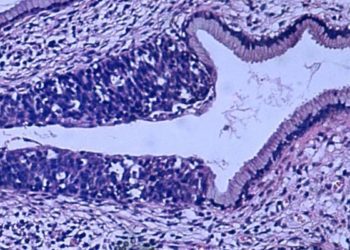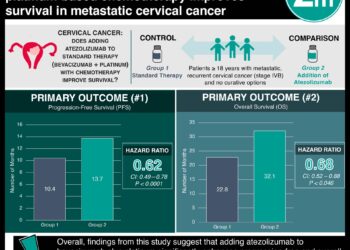Patterns of anti-VEGF treatment for retinopathy of prematurity vary by country
1. In a large, international cohort of infants with retinopathy of prematurity (ROP) treated with intravitreal anti-VEGF injections, the rate of complications was low at 0.9%.
2. Retreatment with laser and/or repeat anti-VEGF injection was required in 36% of eyes, with significantly higher retreatment rates in the United States than international sites.
Evidence Rating Level: 2 (Good)
Study Rundown: Retinopathy of prematurity (ROP) is a common cause of blindness in children. Intravitreal anti-VEGF injections have emerged as an alternative to laser photocoagulation therapy for the treatment of severe ROP. However, due to lack of current clinical consensus, multiple anti-VEGF medications are used at different dosages and with different administration methods. This study aimed to examine current differences in these factors, including national differences. Nearly 1,700 eyes of about 900 infants treated with anti-VEGF injections at 23 sites in 8 countries were included. Bevacizumab was the anti-VEGF agent used in a large majority of injections, most commonly at half the dose given for wet age-related macular degeneration in adults. The rate of complications from anti-VEGF injection was 0.9%, with vitreous hemorrhage being the most common complication. Retreatment, most commonly laser, was needed in 36% of eyes. Rates of retreatment were significantly higher in infants treated in the US than outside the US, at 58.3% and 11.8%, respectively. Ranibizumab was also used more often and at lower doses in the US. The difference in retreatment rates in the US compared to other countries is likely in large part due to the significantly lower gestational age and birth weight and higher rate of aggressive ROP in the US subgroup of the study population. This study provides valuable, detailed information on the current use of anti-VEGF therapy for ROP. However, temporal analysis of changes in retreatment rates and other patterns is also needed given recently evolving evidence on the efficacy of anti-VEGF injections in this population.
Click to read the study in Ophthalmology
Relevant Reading: 80 years of vision: Preventing blindness from retinopathy of prematurity
In-Depth [retrospective cohort]: Infants treated with anti-VEGF alone or anti-VEGF and laser therapy between 2007 and 2021 were included. Among 23 included clinical sites, 16 were in the United States, accounting for 52% of eyes; other countries represented were Canada, Chile, Dominican Republic, Japan, Mexico, Taiwan, and Turkey. Most eyes — 82% — had stage 3 ROP, meaning advanced disease without retinal detachment. ROP was present in zone I, near the macula, in 29.7% of eyes. “Plus disease,” or dilated, tortuous retinal blood vessels, was present in 85.4% of eyes. Antibiotics, most often third-generation fluoroquinolones, were commonly co-administered, but with much variation. Most injections were performed using a 30 G needle, though 32 G needles were used more often in the US. In a survey of providers in the study group, US physicians reported tolerating less peripheral avascularity at 60 weeks post-conception than non-US physicians. US providers also reported that a greater percentage of their laser retreatments after anti-VEGF were prophylactic rather than treatment of worsening disease.
Image: PD
©2022 2 Minute Medicine, Inc. All rights reserved. No works may be reproduced without expressed written consent from 2 Minute Medicine, Inc. Inquire about licensing here. No article should be construed as medical advice and is not intended as such by the authors or by 2 Minute Medicine, Inc.

![2 Minute Medicine: Pharma Roundup: Price Hikes, Breakthrough Approvals, Legal Showdowns, Biotech Expansion, and Europe’s Pricing Debate [May 12nd, 2025]](https://www.2minutemedicine.com/wp-content/uploads/2025/05/ChatGPT-Image-May-12-2025-at-10_22_23-AM-350x250.png)





